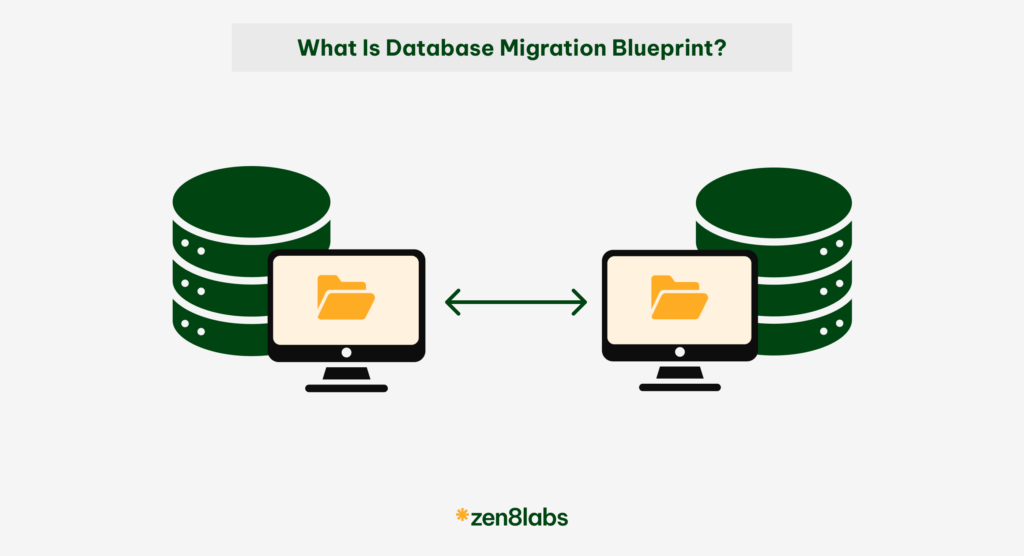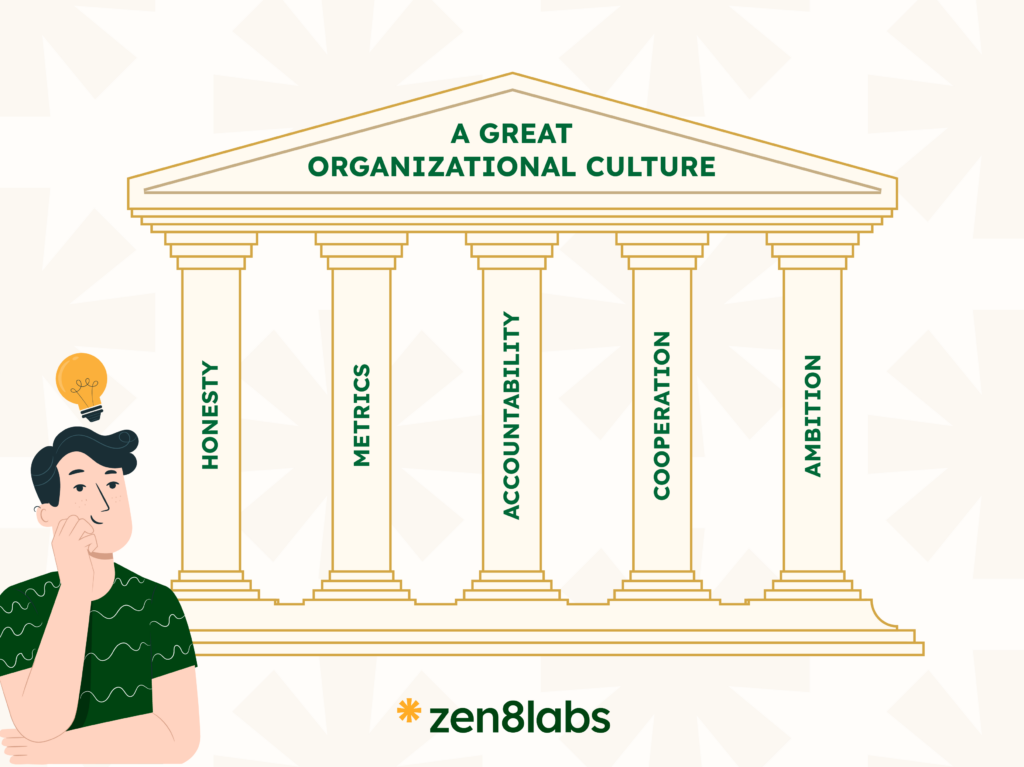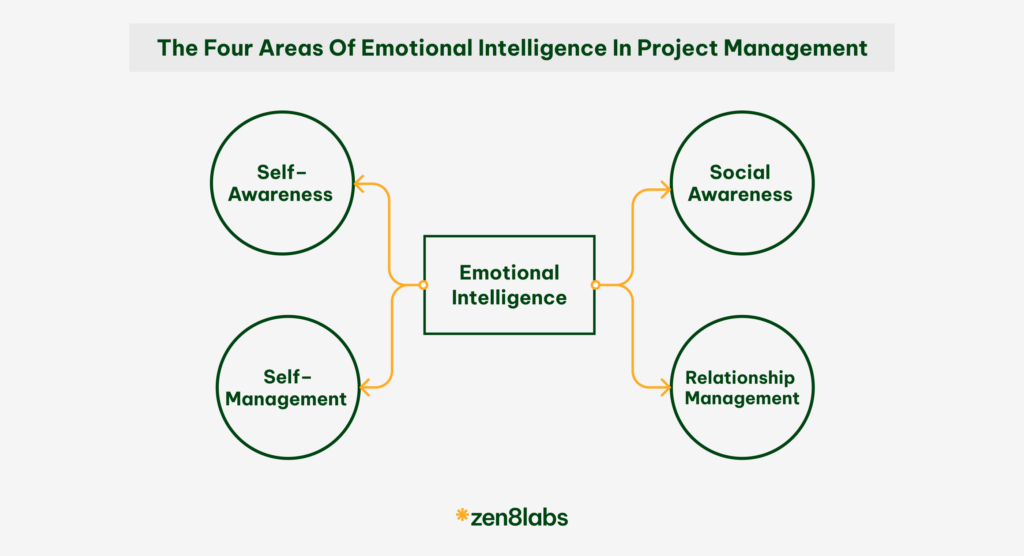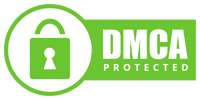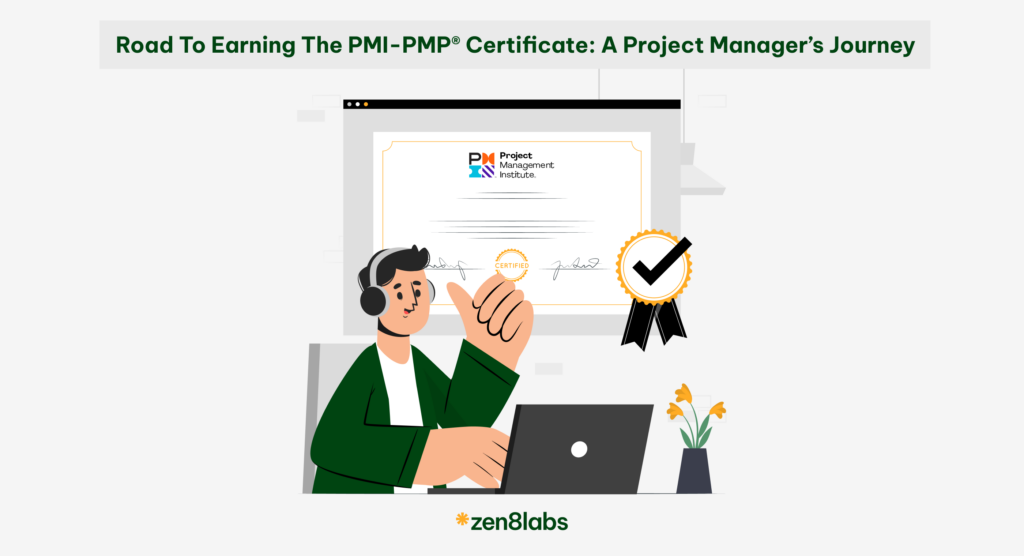
Through my dedication to project management at zen8labs, I understand the value of continuous growth and certification in enhancing your career. The Project Management Professional (PMP) certification, offered by the Project Management Institute (PMI), represents the gold standard in the industry, validating your expertise and commitment. Within a dynamic industry where project management is key to success, earning your PMP certificate can significantly elevate your skills and open doors to new opportunities. Join me as I share my journey towards achieving the PMP certification, offering insights, strategies, and lessons learned to help you succeed in your own certification journey.
What is the PMP Certificate?
The Project Management Professional (PMP) certificate is a globally recognized credential offered by the Project Management Institute (PMI). It validates your competence to perform in the role of a project manager, leading and directing projects and teams. The certification covers a broad spectrum of project management techniques, including predictive, agile, and hybrid methodologies. At zen8labs, we recognize the importance of such certifications in ensuring our project managers are well-equipped to handle diverse client needs.
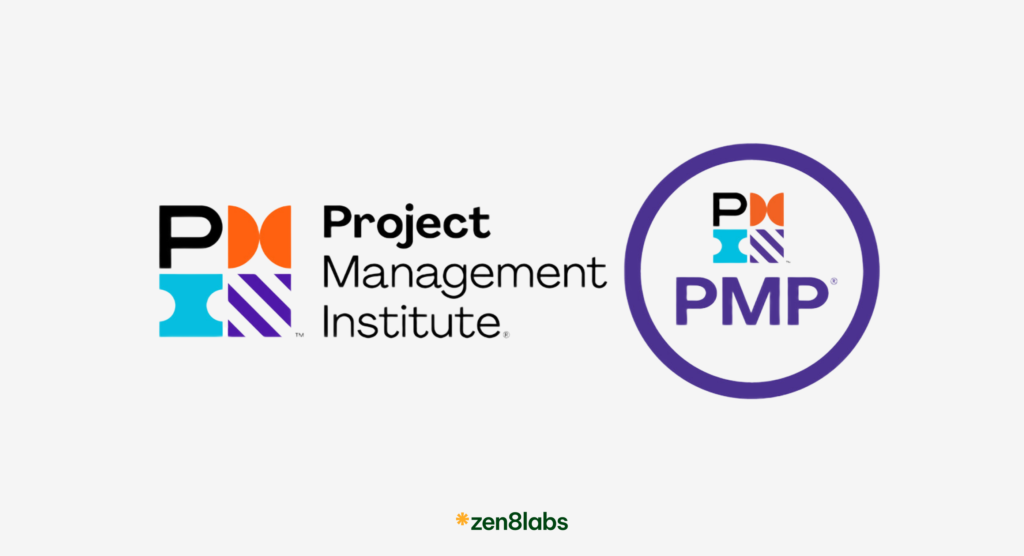
Why do I, as a Project Manager, need the PMP Certificate?
The PMP certificate sets you apart in the industry, demonstrating your expertise and commitment to the profession. At zen8labs, we focus on the development of our team members, and obtaining the PMP credential is a testament to our dedication to excellence. It opens up opportunities for career advancement, higher salary prospects, and recognition among peers. As a project manager at zen8labs, the PMP credential equipped me with the best practices and methodologies to manage projects more effectively, ensuring our clients receive top-notch service.
The learning progress to get the certificate
Starting the process to obtaining the PMP certificate requires a well-organized approach to learning. Here’s a detailed breakdown of the steps:
- Understand the PMP exam content outline: Familiarize yourself with the domains and tasks outlined by PMI. The PMP exam content outline is available on the PMI website and provides a comprehensive guide to what is covered in the exam.
- Choose a study plan: Decide between self-study or enrolling in a formal PMP exam prep course. Self-study might be suitable if you are disciplined and have a strong project management background, while a formal course can provide structured learning and expert guidance. zen8labs supports employees in choosing the best path for their professional development.
- Gather study materials:
- PMBOK Guide (6th and 7th Editions): The PMBOK (Project Management Body of Knowledge) Guide is essential as it forms the foundation of the PMP exam content.
- Rita Mulcahy’s PMP Exam Prep (10th Edition): Known for its practical approach and tips for passing the exam.
- Agile Practice Guide: Important for understanding agile methodologies, which are a significant part of the PMP exam.
- Other recommended books: Head First PMP by Jennifer Greene, PMP Exam Prep Simplified by Andrew Ramdayal.
- Create a study schedule: Commit to a consistent study schedule each week, covering all exam domains. Break down the syllabus into manageable sections and allocate time for each. Try to include revision periods and buffer zones for unforeseen delays.
- Join study groups: Engage with other PMP aspirants to exchange knowledge and insights. Online forums, local PMI chapters, and social media groups can be valuable resources for support and networking. At zen8labs, we encourage collaborative learning and often organize study groups for our employees.
- Utilize online resources: Leverage webinars, online courses, and practice exams. Websites like Udemy, LinkedIn Learning, and Study Hall offer comprehensive PMP prep courses. PMI also offers a PMP Exam Prep course which can be very beneficial.
- Practice, Practice, Practice: Regularly take practice exams to familiarize yourself with the exam format and question types. Websites like PMTraining, ExamCentral, and PM PrepCast offer high-quality mock exams and practice questions.
Tips:
Using mind mapping while studying Rita Mulcahy’s PMP Exam Prep book can enhance my learning by organizing information visually. Start with a central node for the book or chapter, branching into main topics like project scope and cost management. Break down each area into sub-nodes for specific processes, using keywords, icons, and colors to differentiate concepts. Include process groups and ITTOs, summarizing key points and tips from the book. Regularly update and review your mind map, connecting related concepts to see the bigger picture. Utilize mind mapping software for added features and collaborate with study partners to enrich your map with diverse insights.
Applying knowledge gained during the learning period
Throughout the preparation phase, you’ll acquire in-depth knowledge of project management principles and practices. At zen8labs, we believe in applying this knowledge to our current projects by:
- Enhancing project plans: Integrate PMI methodologies into your project planning process. Use the tools and techniques learned to create more robust and comprehensive project plans.
- Improving risk management: Use techniques learned to identify and mitigate project risks. Implement a proactive approach to risk management by regularly updating risk registers and conducting risk assessments.
- Optimizing communication: Implement best practices for stakeholder communication and reporting. Develop a communication plan that keeps all stakeholders informed and engaged throughout the project lifecycle.
- Boosting team performance: Apply leadership strategies to improve team dynamics and performance. Utilize motivational theories and conflict resolution techniques to create a high-performing team environment.
Mock tests and question practice
I know many of you lose motivation after just a few days of practicing full-length mock tests because the questions get harder and there is time pressure. When scores are low, many people tend to stop, go back to reading theory, and naturally, the study group falls apart. That’s why I suggest finding 1-2 like-minded individuals to motivate each other and keep moving forward. Find 1-2 study buddies with similar exam plans, then discuss and create a detailed exam preparation plan. You should follow the order of the exercises in the 30-day study schedule provided by the teaching assistant. However, you can condense it into about 25 days (about 3 and a half weeks) if you can manage the time or extend it to 45-60 days (about 2 months) to reduce pressure. The study period shouldn’t be too long, as it can affect your life and work.
Mock tests are crucial for assessing your readiness for the PMP exam. Here’s how to make the most of them:
- Simulate exam conditions: Take full-length practice exams to get a feel for the actual test environment. Set aside four hours without interruptions to mimic the real exam conditions.
- Review incorrect answers: Understand why your answers were wrong and learn from your mistakes. Review explanations provided and referred back to the PMBOK Guide or study materials for clarification.
- Focus on weak areas: Identify and strengthen areas where you struggle the most. Use targeted practice questions and revision sessions to improve your understanding and performance in those areas.
- Consistency is Key: Regular practice with mock tests builds confidence and improves time management skills. Aim to complete at least one full-length mock test (4 hours length) each week as you approach the exam date.
Tips:
On exam day, ensure you get a good night’s sleep, eat a healthy breakfast, and arrive early with necessary documents. Dress comfortably and manage your time efficiently. Carefully read each question, use the process of elimination, and take short breaks if allowed. Stay calm and confident, using scratch paper for notes and complex problems. Trust your study plan, review answers if time permits, and stay hydrated. After the exam, relax and unwind, knowing you did your best.
Lessons learned after successfully passing the exam
Passing the PMP exam is a significant milestone, and the journey teaches you several valuable lessons:
- Discipline and commitment: Rigorous preparation instills a strong sense of discipline. Balancing study with work and personal commitments requires dedication and time management skills.
- Enhanced knowledge: You gain a comprehensive understanding of project management frameworks. The knowledge acquired extends beyond exam preparation and becomes a part of your professional toolkit.
- Improved confidence: Achieving the certification boosts your confidence in managing complex projects. It reassures you of your capabilities and knowledge in the field of project management.
- Professional growth: The PMP credential opens new career opportunities and professional networks. It can lead to promotions, higher-paying roles, and increased responsibilities within your organization. At zen8labs, we see this growth as a vital part of our mission to deliver exceptional service to our clients.
What’s next after passing the certificate
After achieving the PMP certification, the journey doesn’t end; it’s just the beginning of a new chapter. Here’s an example of what a Project Manager should aim for and how zen8labs supports your continuous development:
- Continued professional development: Stay updated with the latest trends and practices in project management. Attend PMI chapter meetings, webinars, and conferences to keep your knowledge current. zen8labs provides opportunities for ongoing education and training to ensure our team remains at the forefront of the industry.
- Mentorship and leadership: Use your new credentials to mentor junior project managers and share your knowledge. At zen8labs, we promote a culture of mentorship, where experienced professionals guide and support the growth of their peers.
- Apply advanced techniques: Implement the advanced project management techniques you’ve learned in your daily work. Take on more complex and challenging projects to continue honing your skills.
- Network expansion: Leverage your PMP certification to expand your professional network. Join PMI communities, participate in industry forums, and connect with other project management professionals. zen8labs encourages active participation in professional networks to build strong industry connections.
- Career advancement: Explore new career opportunities within zen8labs and beyond. The PMP certification opens doors to higher-level project management roles, leadership positions, and specialized project management areas.
Conclusion
The road to obtaining the PMP certificate is demanding but immensely rewarding. It not only validates your project management skills but also enhances your ability to lead successful projects. By committing to this journey, you invest in your professional growth and set yourself on a path to greater career achievements. The PMP credential is more than just a certification; it’s a testament to your dedication, knowledge, and expertise in the field of project management, the areas which are seen in our work at zen8labs.
Hiep Nguyen, Project Manager
